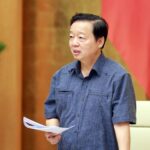Multi-Purpose Land Use Application in Hue City
On August 21, the Department of Agriculture and Environment of Hue City issued a response to Ms. Le Thi Tram Anh from Ho Chi Minh City regarding her request for guidance on procedures for multi-purpose land use for a farmstay project at 141 Da Le Street, Ward 12, Thanh Thuy, Hue City.
Decision Made by the Ward Authority
According to the Department, the Government’s Decree No. 102/2024/ND-CP dated July 30, 2024, details certain articles of the Land Law, stating: “Multi-purpose land use is the utilization of a portion of land designated for a primary purpose for another purpose as stipulated in Article 218 of the Land Law.”
The decree further clarifies that the area of land used for multi-purpose activities should not exceed 50% of the area used for the primary purpose, excluding residential land with multi-purpose usage. Any construction on agricultural land for multi-purpose use must be easily removable and appropriate in scale and nature.

Newly constructed traditional houses are seen near the entrance.
The 2024 Land Law also specifies the types of land eligible for multi-purpose use, including agricultural land combined with commercial, service, animal husbandry, and medicinal plant cultivation purposes, as well as residential land combined with agricultural, commercial, service, and business-oriented public utility purposes.
Multi-purpose land use must comply with the requirements outlined in Clause 2, Article 218 of the 2024 Land Law. The scope and conditions for multi-purpose land use should adhere to Clause 2, Article 99 of Decree No. 102/2024/ND-CP.

Dozens of prefabricated structures with iron frames and tarpaulin covers were found to be complete during the inspection.
Notably, in the case of using agricultural land for commercial and service purposes, a land use plan must be established and submitted to the competent authority for approval. The dossier, procedure, and approval process are governed by Decree 102/2024/ND-CP.
The Department of Agriculture and Environment of Hue City affirmed that the authority to approve or disapprove Ms. Tram Anh’s proposal lies with the People’s Committee of Thanh Thuy Ward. Therefore, she is advised to contact the Ward authority directly for consideration and resolution.
Multiple Structures Already Constructed
Nguoi Lao Dong newspaper previously reported that the 13-hectare plot was originally agricultural land with an attached 400 square meters of residential land, owned by Mr. Vo Van Tai.
On July 28, the People’s Committee of Thanh Thuy Ward conducted an inspection and issued a violation notice to Mr. Tai, instructing the Khang Loc Investment Joint Stock Company to cease promoting and providing accommodation services without permission.
At the time of the inspection, dozens of structures for accommodation, entertainment, and other purposes were found on the land plots designated for agricultural use. While the Ward authority ordered a halt to construction, no penalties were imposed for illegal construction.
In early August, Ms. Le Thi Tram Anh acquired the land through a transfer and submitted a proposal for guidance on farmstay construction procedures. The Ward authority, upon reviewing the proposal, requested her to make adjustments to ensure compliance with legal regulations.
Unlocking Development Potential: A Critical Amendment to the Land Law
“The proposed amendments to the Land Law introduce a significant change regarding land recovery for investment projects. Specifically, if an investment project reaches the land recovery time limit, the state will recover the remaining land area and allocate or lease it to the investor, provided they have agreed with over 75% of land users or secured more than 75% of the land area.”
Vice Premier Requests Implementation of Unified Land Price Schedule, Advocating for a “Single-Value” Land Valuation System Determined by the State
“Deputy Prime Minister Tran Hong Ha affirmed that land valuation must adhere to the principle of “one price” determined by the state and uniformly applied in all transactions.”













































